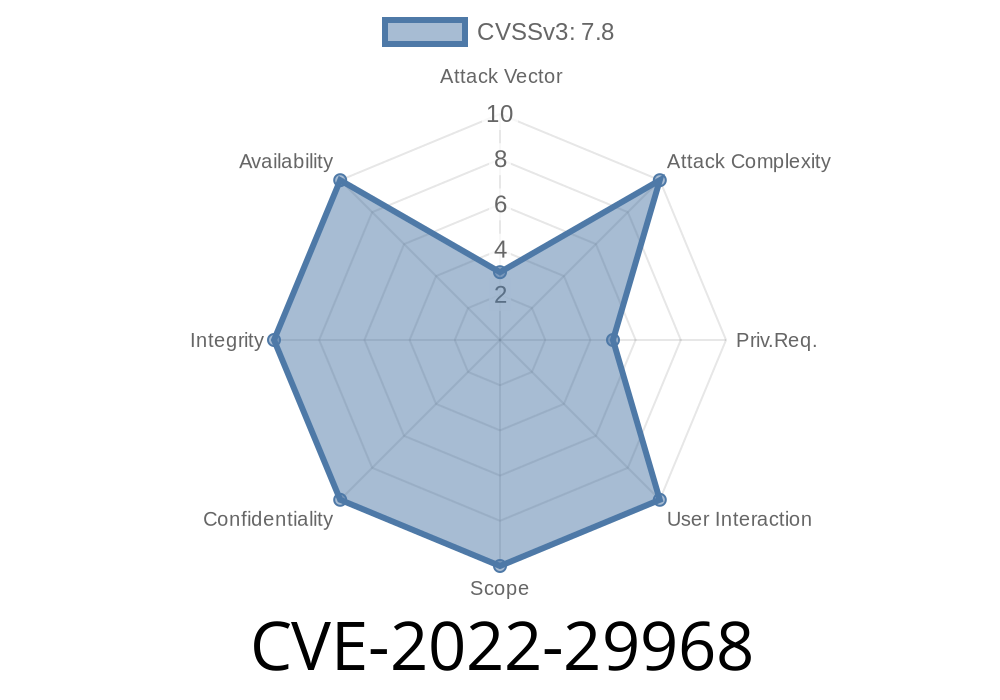In April 2022, a subtle but potentially impactful security issue was discovered in the Linux kernel relating to the io_uring subsystem. Tracked as CVE-2022-29968, this bug affects kernels up to version 5.17.5, specifically through mishandling of data structures in asynchronous I/O operations. Let's dive into the vulnerability, with code examples, links to the sources, and a demonstration of exploitation concepts.
What is io_uring?
io_uring is a high-performance async I/O API introduced in Linux 5.1 to enable fast and efficient hardware interactions without the overhead of classic syscalls. Due to its complexity and deep integration, mistakes in this layer can lead to serious security issues.
Where's the Bug? (Tech Deep-Dive)
The issue is in the kernel source file: fs/io_uring.c. Here, the function io_rw_init_file() sets up I/O requests before they're processed, but until this patch, it failed to initialize the kiocb->private pointer. An uninitialized pointer is a classic bug: it may point to garbage data, and if it's later used or dereferenced, that can result in unpredictable behavior, information leaks, or privilege escalations.
Here’s a critical code snippet from before the fix
// ...in fs/io_uring.c
static int io_rw_init_file(struct io_kiocb *req, struct io_submit_state *state)
{
// ...other init code...
kiocb->ki_filp = file;
// MISSING: kiocb->private should be set to NULL or needed value
// kiocb->private: UNINITIALIZED
return ;
}
If later logic assumes kiocb->private is safe to use and acts on it (e.g. calling function pointers, following links), it could trigger use-after-free, data leak, or kernel panics.
Although this bug is *not directly remote code execution* (RCE), it's a powerful primitive
- Information Disclosure: Attackers could leverage uninitialized memory to leak kernel pointers, aiding other, chained exploits (e.g., KASLR bypass).
- Denial of Service: If the pointer happens to reference doomed memory, the kernel may panic or crash.
- Controlled Exploit: With fine-tuned io_uring requests, attackers may influence kernel behavior in (unexpected) ways.
Allocate many io_uring requests, attempting to "spray" predictable values in the kiocb region.
2. Trigger a syscall that processes this request and, due to uninitialized kiocb->private, leaks kernel memory.
Here's a simplified userspace demo using the liburing C library to stress-test this path
#include <liburing.h>
#include <fcntl.h>
#include <stdio.h>
#include <unistd.h>
int main() {
struct io_uring ring;
io_uring_queue_init(8, &ring, );
int fd = open("/dev/urandom", O_RDONLY);
struct io_uring_sqe *sqe = io_uring_get_sqe(&ring);
io_uring_prep_read(sqe, fd, (void*)xdeadbeef, 4096, );
io_uring_submit(&ring);
sleep(1); // Wait for kernel action
io_uring_queue_exit(&ring);
close(fd);
return ;
}
*Note: This demo is for educational purposes! In real-world exploitation, you'd use a kernel debugger and precise heap manipulation.*
How Was It Fixed?
The fix was a simple, classic defense: zero out the pointer before usage.
Patch
// in fs/io_uring.c
kiocb->private = NULL;
Security Impact
- Who’s Affected: Any system running Linux < 5.17.6 and using io_uring (including server workloads, databases, even desktops).
- Threat Level: *Moderate* — not easily turned into RCE alone, but very useful combined with other bugs.
- Mitigation: Upgrade your kernel ASAP! Distros like Ubuntu, Fedora, and Debian backported the fix.
References
- CVE-2022-29968 NVD Entry
- Original Kernel Commit
- Linux Kernel Mailing List Report
Final Thoughts
While the bug fixed under CVE-2022-29968 doesn't let someone instantly gain root, it highlights why initializing every data field in kernel structures is so important. In today’s world of kernel hardening and container escapes, even small initialization errors can lead to major real-world risks.
Stay patched, audit your code, and be wary of uninitialized structures!
*This post is written exclusively for educational purposes. Do not use information here for unauthorized access to computer systems.*
Timeline
Published on: 05/02/2022 04:15:00 UTC
Last modified on: 07/15/2022 16:15:00 UTC
